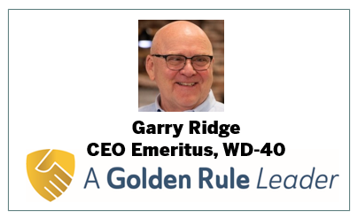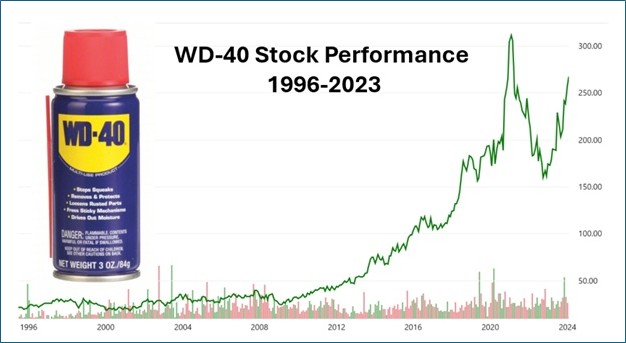Garry Ridge, CEO Emeritus, WD-40: A Golden Rule Leader
About the Designation
Purpose Can Enhance Profits
Dealing With Tradeoffs
Click here to subscribe to the ESM weekly e-newsletter.
With a long list of people and organizations to recognize, not necessarily in any order, it seemed appropriate this week to highlight Garry Ridge.
 Appropriately, Ridge is speaking this week at the Purpose Summit, May 13-15 in Charlotte, founded by Davin Salvagno with Ridge’s support, to promote capitalism as a force for good in the image of Costco. Salvagno is a former marketing manager at Costco, who is also on the list of people to be highlighted at a later date.
Appropriately, Ridge is speaking this week at the Purpose Summit, May 13-15 in Charlotte, founded by Davin Salvagno with Ridge’s support, to promote capitalism as a force for good in the image of Costco. Salvagno is a former marketing manager at Costco, who is also on the list of people to be highlighted at a later date.Because few if any of the people we select have heard of the term “stakeholder capitalism,” or even fully understand what it means, selections of people or organizations are made based on highlighting those who seek win-win relationships with all stakeholders because they are convinced it’s a better path to sustainable success for everyone. The EEA does not do business with any of the organizations or individuals selected and would disclose such if that is ever the case.
Golden Rule leaders and organizations aren’t saints. Everyone with responsibilities has had to make painful tradeoffs and mistakes or have their own scars or flaws. Every person or organization selected for this designation has a long track record of actions or outcomes consistent with the principle that organizations that harmonize the interests of their employees, customers, distribution and supply chain partners, and communities, will have a better chance of sustainable success than those that don’t.
About the Designation
Ridge, now retired from his position at WD-40, is the sixth leader selected by the Enterprise Engagement Alliance to illustrate the principles and leadership paradigm of stakeholder capitalism. Having just published his book, Any Dumbass Can Do it, a prescription for effective leadership, he’s an active speaker, executive coach, and podcast guest happy to share his vision.
He joins JUST Capital, a leading advocacy group for stakeholder capital; Costco, the retailer, which embodies principles of stakeholder capitalism; R. Edward Freeman, Professor at the Darden School at the University of Virginia, considered the “father” of stakeholder capitalism; Joe Hinrichs, President and CEO of CSX railroad, who demonstrates the principles almost every day in his Linkedin posts, and Ed Bastion, CEO of Delta Airlines. Click here details about each of them.
These organizations, leaders, or academics are chosen based on their work or actions advocating for or demonstrating the value of harmonizing the interests of all shareholders and stakeholders toward a common purpose, goals, objectives, and values. One a week is selected and posted on Linkedin on Mondays and added to this list on the EEA web site until the Golden Rule Alliance site is launched in spring 2025.
Ridge is retired now after a stellar career at WD-40, with a return for shareholders that almost looks like a Nvidia over his tenure, due in part to a very successful international expansion. What he appears most proud of is his strategic focus on people, the importance of creating a powerful culture, what he has called a tribe. During the Great Recession, when almost everyone in manufacturing and related suppliers laid off the majority of their workforces, Ridge found a way to keep them all employed. People made sacrifices, jobs were shared, but everyone remained employed. Guess what. When the economy returned, which industrial lubricant form was able to spring most quickly back into action?
Purpose Can Enhance Profits
In an interview with the EEA’s ESM recorded on an EEA YouTube Show, Ridge says: “You know, profit is not a sin...You must build an organization that
 creates an economic flow that allows you to support your people. You have the privilege to lead and to serve the investors who are trusting you with their investment. We had a return on invested capital of over 32%, which means that we were very efficient in making sure that the capital that we were privileged to have was well treated.”
creates an economic flow that allows you to support your people. You have the privilege to lead and to serve the investors who are trusting you with their investment. We had a return on invested capital of over 32%, which means that we were very efficient in making sure that the capital that we were privileged to have was well treated.”On the other hand, he adds, “There are many measures out there, it’s not just one thing but a combination of all to get to the end result that you want to get to.” As for stock price, a CEO, he says, has little control over it. “All we can do is help build organizations that live their values and as producers provide dependable results. At WD-40, we always paid dividends, which is important, but it is also about your capital structure. There are so many things that go into the business side, but if at the end of the day, your people go to work every day and are not just sitting there or quitting, you’ll not get the full result you want. Too many companies spend a disproportionate amount of their time on strategy and execution. Strategy is easy. The people stuff is hard because we’re dealing with the most complex thing in the world: ourselves and our people.”
Ridge summarizes the characteristics of a purpose leader. “Do you have a set of values in the organization that protect people and set them free as leaders? Are you loving of your people? Enough to reward them and applaud them for doing great work. And are you brave enough to redirect them and not focus on protecting your own comfort zone at the expense of other peoples’ development? And, do you do it every minute of every day? If this was soft, a lot of people would be doing it. This is hard, particularly when you have people with short-term thinking saying you missed your quarterly results by a penny.”
Dealing With Tradeoffs
Leading with a clear sense of purpose, Ridge points out, helps make it easier to make difficult decisions. When the great recession hit and its industrial business took a big hit, the company stood by its purpose and decided not to lay off one person. “We decided it was better for all of us to hurt a little than a few people to hurt a lot.” The company froze salaries but was able to maintain benefits. It also used the period to undertake a complete cost evaluation process to identify ‘stupid’ policies and procedures. So, it was a very cleansing time as well.” When the economy recovered, “we came out of that thriving because we didn't have to go and restock the talent pool or the brain trust.”
People leadership is much simpler to explain than to implement, Ridge says. “You can't sprinkle fairy dust over a company and change the culture.” It starts with understanding the organization’s true purpose, where the organization wishes to go, “and then you have to stick with this, even if that means telling some potential investors don’t buy our stock because you’ll never be satisfied. But if you want to help build an enduring company that we’re going to be proud of and hand off to others in a better state, come join us.” It takes time, he says “to embed the values in the organization necessary to reduce fear, to take the word failure out and replace it with learning moments. All of that took time and several years before our financial performance and stock began to take off. And the only reason it did is that we started to perform above and beyond and then above and beyond what we had done in the past. Again, that is because we had such a high percentage of people going to work every day all in.”
He says: “Culture equals values plus behavior times consistency,” adding, “Our purpose at WD-40 was to create positive lasting memories, solving problems and creating opportunities in factories, homes, and workshops around the world. So, if you asked me what’s our business, I’d say we're in the memories business.”
To Ridge, part of the problem in business is leadership ego. “We get to the top and we say it feels good to be here.” But that’s not the right attitude, he insists. “My personal list says, ‘I want to be grateful. I want to be caring. I want to be empathetic. I want to be reasonable. I want to be a listener. I want to be facts-based. I want to have a balanced opinion. I want to be curious. I want to be a learner and I want to spread sunshine, not cast shadows. It’s consistency for what you really stand for and being brave enough to stand up. At most organizations, the video doesn’t match the script.”
Enterprise Engagement Alliance Services
 Celebrating our 15th year, the Enterprise Engagement Alliance helps organizations enhance performance through:
Celebrating our 15th year, the Enterprise Engagement Alliance helps organizations enhance performance through:1. Information and marketing opportunities on stakeholder management and total rewards:
- ESM Weekly on stakeholder management since 2009. Click here to subscribe; click here for media kit.
- RRN Weekly on total rewards since 1996. Click here to subscribe; click here for media kit.
- EEA YouTube channel on enterprise engagement, human capital, and total rewards since 2020
 Management Academy to enhance future equity value for your organization.
Management Academy to enhance future equity value for your organization.3. Books on implementation: Enterprise Engagement for CEOs and Enterprise Engagement: The Roadmap.
4. Advisory services and research: Strategic guidance, learning and certification on stakeholder management, measurement, metrics, and corporate sustainability reporting.
5. Permission-based targeted business development to identify and build relationships with the people most likely to buy.
Contact: Bruce Bolger at TheICEE.org; 914-591-7600, ext. 230.














